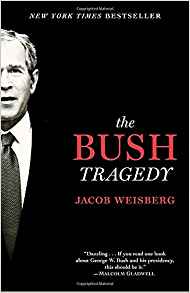
March 15, 2008
Joseph Stiglitz and Linda Bilmes
This is one of those very rare endeavors that is a tour d'force on multiple fronts, and easy to read and understand to boot.
It is a down-to-earth, capably documented indictment of the Bush-Cheney Administration's malicious or delusional–take your pick–march to war on false premises.
As a policy “speaking truth to power” book; as an economic treatise, as an academic contribution to the public debate, and as a civic duty, this book is extraordinary.
Highlights that sparked my enthusiasm:
1) Does what no one else has done, properly calculates and projects the core cost of war–and the core neglect of the Bush-Cheney Administration in justifying, excusing, and concealing the true cost of war: it fully examines the costs of caring for returning veterans (which some may recall, return at a rate of 16 to 1 instead of the older 6 to 1 ratio of surviving wounded to dead on the battlefield).
2) Opens with a superb concise overview of the trade-off costs–what the cost of war could have bought in terms of education, infrastructure, housing, waging peace, etcetera. I am particularly taken with the authors' observation that the cost of 10 days of this war, $5 billion, is what we give to the entire continent of Africa in a year of assistance.
3) Fully examines how costs exploded–personnel costs, fuel costs, and costs of replacing equipment. The authors do NOT address two important factors:
+ Military Construction under this Administration has boomed. Every Command and base has received scores of new buildings, a complete face lift, EXCEPT for the WWII-era huts where those on the way to Iraq and Afghanistan are made to suffer for three months before they actually go to war.
+ The Services chose not to sacrifice ANY of their big programs, and this is a major reason why the cost of the war is off the charts–we are paying for BOTH three wars (AF, IQ, GWOT) AND the “business as usual” military acquisition program which is so totally broken that it is virtually impossible to “buy a ship” with any degree of economy or efficiency.
4) The authors excel at illuminating the faulty accounting, the subversion of the budget process, and they offer ten steps to correction that I will not list here, but are alone worth the price of the book. What they do not tell us is:
+ Congress rolled over and played dead, abdicating its Article 1 responsibilities–the Republicans as footsoldiers, the Democrats as doormats.
+ The Office of Management and Budget (OMB) has not done the “M” since the 1970's and is largely worthless today as a “trade-off manager” for the President.
5) I am blown away by the clear manner in which the authors' show the skyrocketing true cost up from a sliver of the “original estimate” out to a previously unimaginable 2.7 trillion (cost to US only, not rest of world). The interest cost in particular is mind-boggling.
6) They note that the costs the government does NOT pay include:
+ Loss of life and work potential for the private sector
+ Cost of seriously injured to society
+ Mental health costs and consequences
+ Quality of life impairment (I weep for the multiple amputees)
+ Family costs
+ Social costs
+ Homefront National Guard shortfalls needed for Katrina etc.
7) The authors go on to discuss the costs to other countries and to the globe, beginning with the refugees and the Iraqi economy. They do NOT mention what all US Army officers know, which is that Saddam Hussein ordered all the nuclear and chemical materials dumped into the river, and the mutations, deaths, and lost agricultural productivity downstream have yet to be calculated.
8) They touch on three delusions that John McCain and others use to demand that we “stay the course” and this also merits purchase of the book. I was in Viet-Nam from 1963-1967, and I well remember exactly the same baloney being put forth then. We ought to apologize to the Iraqi people, and instead of occupying the place, give them the billions they need to restructure after our devastating occupation.
They conclude the book with 18 recommended reforms, each very wise, and these I will list–the amplification provided by the authors in the book is stellar.
1. Wars should not be funded through “emergency” supplementals.
2. War funding should be linked to strategy reviews (and guys like Shinseki should kick morons like Wolfowitz down the steps of Capitol Hill when they contradict real experts and lie to Congress and the public)
3. Executive should create a comprehensive set of military accounts that include all Cabinet agency expenditures linked to any given war.
4. DoD should be required to present clean, auditable financial statements to Congress, for which SecDef and the CFO should be accountable (let us not forget that Rumsfeld was being grilled on the Hill on 10 September about the missing $2.3 trillion, and the missile that hit the Pentagon rather conveniently destroyed the computers containing the needed accounting information)
5. Executive and CBO should provide regular estimates of the micro- and macroeconomic costs of a military engagement (over time).
6. [simplified] Congress must be notified by any information controls that undermine the normal bureaucratic checks and balances on the flow of information.
7. [simplified] Congress should reduce [or forbid] reliance on contractors in wartime, and explicitly not allow their use for “security services, while ensuring all hidden costs (e.g. government insurance) are fully disclosed.
8. Neither the Guard nor the Reserve should be allowed to be used for more than one year unless it can be demonstrated the size of the active force cannot be increased.
9. [simplified] Current taxpayers should pay the cost of any war in their lifetime via a war surtax [rather than imposing debt on future generations]
These next reforms address the care of returning veterans:
10. Shift burden of proof for eligibility from veterans to government
11. Veteran's health care should be an entitlement, not for adjudication
12. Veteran's Benefit Trust Fund should be set up and “locked”
13. Guard and Reserve fighting overseas should be eligible for all applicable active duty entitlements commensurate with their active duty.
14. New office of advocacy should be established to represent veterans
15. Simplify the disability benefits claims process.
16. Restore medical benefits to Priority Group 8 (400,000 left out in the cold)
17. Harmonize the transition from military to veteran status so that it is truly seamless
18. Increase education benefits for veterans.
I put this book down totally impressed. Completely irrespective of one's political persuasion, strategic sagacity, or fiscal views, this book is a tri-fecta–a perfect objective combination of wise policy, sound economics, and moral civic representation.
BRAVO!
I also recommend:
DVD Why We Fight
DVD The Fog of War: Lessons from the Life of Robert S. McNamara
Wilson's Ghost: Reducing the Risk of Conflict, Killing, and Catastrophe in the 21st Century
A More Secure World: Our Shared Responsibility–Report of the Secretary-General's High-level Panel on Threats, Challenges and Change
The Unconquerable World: Power, Nonviolence, and the Will of the People
The Sorrows of Empire: Militarism, Secrecy, and the End of the Republic (The American Empire Project)
The Landscape of History: How Historians Map the Past
Fog Facts: Searching for Truth in the Land of Spin
Web of Deceit: The History of Western Complicity in Iraq, from Churchill to Kennedy to George W. Bush
Afterthought: David Walker, Comptroller General, has resigned from his 15-year appointment after failing to find adult attention within Congress when he briefed them this summer to the effect that the USA is “insolvent.” His word. Our government is broken beyond anyone's wildest imagination. [Note: Mr. Walker is now running the Peter G. Peterson Foundation, with the objective of providing to the public the factual budget information that Congress is ignoring, concealing, or manipulating. As Mr. Walker says, the public is now ahead of the politicians in its understanding, and all that remains is to flush all the incumbents down the toilet in 2008.









